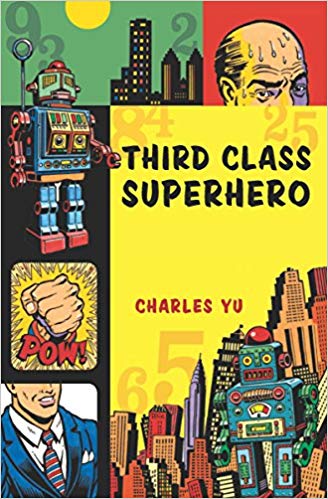With deadpan humor and originality, Charles Yu spins Kafkaesque tales of modern identity and insecurity in this whip-smart debut. In 401(k), a couple living in the Luxury Car Commercial subdivision are disappointed when their exotic vacation turns into a Life Insurance/Asset Management pitch. The author struggles to write the definitive biography of his mother in Autobiographical Raw Material Unsuitable for the Mining of Fiction. And would-be superhero Moisture Man must come to terms with the darkness in his heart.
Throughout the collection, Yu’s characters run up against the limitations of their artificial story lines while tackling the terrifying aspects of existence: mothers, jobs, spouses, and perhaps most terrifying of all, the need to express feelings. Heartbreaking and hilarious, Third Class Superhero marked the debut of an author who has been a PEN award finalist, and whose novel How to Live Safely in a Science Fictional Universe was named one of Time’s best books of the year.
PRAISE & REVIEWS
“Issues of identity and insecurity simmer throughout Yu’s debut collection, an imaginative excursion into the burrow Kafka built. In “My Last Days as Me,” the unnamed star of the hit TV show Me and My Mother chafes at the recasting of his onscreen mother and eradicates the line between actor and character. The unnamed man in “Man of Quiet Desperation Goes on Short Vacation” evaluates his existential condition as frequently as a time-obsessed man checks his watch. And in the title story, “Moisture Man” strives to improve his position in the superhero hierarchy, which means constant self-appraisal and comparison to his more successful counterparts (“fireball shooters. A few are ice makers. Half a dozen telepath/empaths”). Yu flirts with formal experimentation—”Problems for Self-Study” unfolds as a complicated multiple choice test, for example—but tempers his fantastical constructions with level prose. (The first two paragraphs of “The Man Who Became Himself” are “He was turning into something unspeakable” and “At the office, people avoided the issue.”) There is abundant humor, though, and Yu allows the reader to feel pathos without patronization; a neat trick, in a compulsively readable collection.”
—Publisher’s Weekly
“Class Three Superhero transcends what might have been a merely clever premise to speak to us about ambition, envy and the moral dilemmas that our own worst natures force on us. I admire it very much.”
—Jean Thompson, National Book Award Finalist
